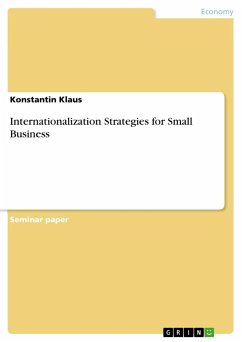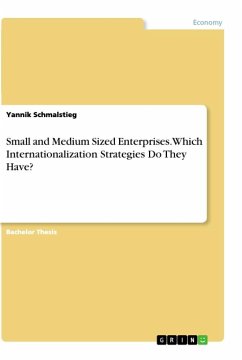Seminar paper from the year 2019 in the subject Business economics - Business Management, Corporate Governance, grade: 1,7, University of applied sciences Frankfurt a. M., course: Strategic Management, language: English, abstract: This paper focuses on different internationalization strategies for small business. The current term paper should explain the basics by defining the essential terms. Subsequently, reasons and motives for internationalization strategies listed for small business. As a result, conceivable market entry forms are to be set out with their advantages and disadvantages. Based on the strategy forms, the opportunities and risks that could arise for small and medium-sized enterprises (SMEs) in an international market entry strategy are then highlighted. Finally, in the last chapter, a conclusion is drawn and daring a look into the future for the small business.Internationalization has undergone a dynamic development in the past three decades. The main driving force were the political changes in the world. This political opening also led to a disproportionate growth in the world trade. These changes also affect small and medium-sized companies and are a current challenge, that should be raised, which is also reflected in the close ties, between the Term middle class and foreign trade shows. The globalization of the economy is forcing medium-sized companies to rethink and restructure their business processes and value chains.However, SMEs lack specific prerequisites for carrying out international business activities. Not just capital and management but also the knowledge of internationalization is a significant success factor. Nevertheless, SMEs can develop opportunities and successfully translate them into an international activity that, especially because of its niche strategy, aims to meet the special needs of international clients that can not satisfied by large companies A niche production or export, however, is not enough to assert oneself against international competitors in the long term. That is why influences like use of technical advances, short product cycles and fast and active presence abroad to internationalize the value chain of the company. For a successful and targeted internationalization strategy for small business, it should be necessary to create a concept that includes motives, market entry forms, possible potentials and conceivable obstacles.
Hinweis: Dieser Artikel kann nur an eine deutsche Lieferadresse ausgeliefert werden.
Hinweis: Dieser Artikel kann nur an eine deutsche Lieferadresse ausgeliefert werden.








